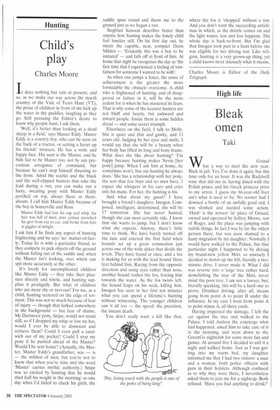Hunting
Child's play
Charles Moore
It does nothing but rain at present, and so, as we make our way across the marsh country of the Vale of Tears Hunt (VT), the posse of children in front of me kick up the water in the puddles, laughing as they go. Still pursuing the Editor's desire to know why people hunt, I ask them.
'Well, it's better than looking at a dead sheep in a field,' says Master Eddy. Master Eddy is a country boy, who can be seen on the back of a tractor, or setting a ferret up his friends' trousers. He has a wide and happy face. His aunt is the Master, and he bids fair to be Master too, not by any precocious arrogance of command, but because he can't stop himself thrusting to the front. Amid the scarlet and the black and the well-clipped hunters that take the lead during a run, you can make out a hairy, sweating pony with Master Eddy perched on top, always there or thereabouts. I call him Master Eddy because of the boy in Somerville and Ross:
Master Eddy had lost his cap and whip, his hair was full of mud, pure ecstasy stretched his grin from ear to ear, and broke from him in giggles of delight.
I ask him if he finds any aspect of hunting frightening and he says 'no' matter-of-factly. Today he is with a particular friend, so they compete to pick objects off the ground without falling out of the saddle and, when the Master isn't looking, over which can spit more accurately at the other.
It's lovely for uncomplicated children like Master Eddy — they take their pleasure directly and whole, and hunting supplies it prodigally. But what of children who are more shy or nervous? For me, as a child, hunting teetered on the edge of torment. This was not so much because of fear of injury — though that lurked somewhere in the background — but fear of shame. My Dartmoor pony, Snipe, would not stand still, so if I dropped my whip or lost my hat, would I ever be able to dismount and retrieve them? Could I even pull a sandwich out of my pocket? Could I stop my pony if he pushed ahead of the Master? Would I be sent home? (Actually, the Master, Master Eddy's grandfather, was — is — the mildest of men, but you're not to know that when you're nine and the word 'Master' carries mythic authority.) Snipe was so excited by hunting that he would shed half his weight in the morning: so one day when I'd failed to check his girth, the saddle spun round and threw me to the ground just as we began a run.
Siegfried Sassoon describes better than anyone how hunting makes the lonely child feel lonelier still. On his first day out, he meets the capable, neat, compact Denis Milden — 'Evidently this was a boy to be imitated' — and falls off in front of him. At home that night he recognises the day as 'the first time that I experienced a feeling of wist fulness for someone I wanted to be with'.
As when one jumps a fence, the sense of achievement is the greater the more formidable the obstacle overcome. A child who is frightened of hunting, and of disapproval or failure in it, will be the more ardent for it when he has mastered its fears. That is why some of the keenest hunters are not bluff and hearty, but awkward and inward people. Inside them is some hidden dread — and some secret triumph.
Elsewhere on the field, I talk to Molly. She is quiet and thin and gawky, and 13 years old. Judging by her eyes and smile, I would say that she will be a beauty when her body has filled its long and bony frame. What does she like about hunting? 'I'm happy because hunting makes Nevin [her pony] jump. When I ask him at home, he sometimes won't, but out hunting he always does.' She has a relationship with her pony, the sort that few boys and no men have. I expect she whispers in his ears and cries into his mane. For her, the hunting is his.
And what about my guest? I have brought a friend's daughter, Imogen. Composed, intelligent, determined, she will be 17 tomorrow. She has never hunted, though she can most certainly ride. I know that she wants to jump, but I don't know what she expects. Anyway, there's little time to think. We have barely turned off the lane and entered the first field when hounds set up a great commotion just across one of the wide dykes that divide the levels. They have found at once, and a fox is making for us with the lead hound three feet behind him. Racing from the opposite direction and using eyes rather than nose, another hound rushes the fox, forcing him towards the water. As the fox twists left, the hound leaps on his neck, killing him. Imogen has seen in her first ten minutes what you can spend a lifetime's hunting without witnessing. The younger children saw it all too — the speed, the precision, the instant death.
You don't really want a kill like that, where the fox is 'chopped' without a run. And you don't want the succeeding anticlimax in which, as the drizzle comes on and the light wanes, less and less happens. The whole day is back-to-front. But I'm glad that Imogen took part in a hunt before she was eligible for her driving test. Like religion, hunting is a very grown-up thing, yet a child knows most intensely what it means.
Charles Moore is Editor of the Daily Telegraph.


















































 Previous page
Previous page